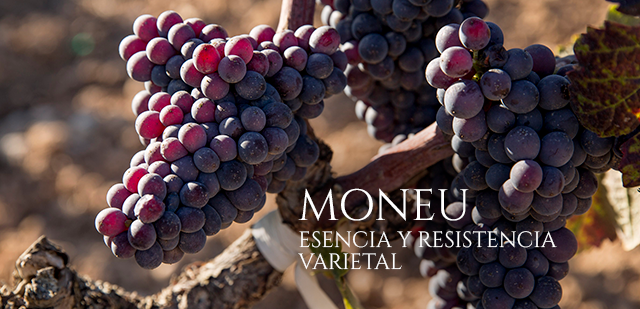MONEU

The years 2014, 2015 and 2016 are the hottest years on record since we began tracking annual average temperatures. In 2017 the trend of gradually rising temperatures seems to continue, tangibly corroborating the consequences of global warming and its effects on agriculture in general and winegrowing in particular.
That being said, the grapevine, much like us humans, has an astonishing ability to adapt to new climatic contexts. Biologically speaking, it is a perfect machine that can alter its metabolism when it senses an imminent drought by either speeding up or slowing down its phenolic ripening and/or vegetative growth cycle.
The fact that these ancestral varieties are very adaptable to our changing climate reality is one of the reasons why the project to revive them is so important.
Moneu not only displays excellent enological potential, but is also innately resistant to drought, an inherent feature of our wine region's climate.
[[{"fid":"11256","view_mode":"default","fields":{"format":"default","field_file_image_alt_text[und][0][value]":false,"field_file_image_title_text[und][0][value]":false},"type":"media","link_text":null,"attributes":{"height":378,"width":416,"class":"media-element file-default"}}]]
Cluster of the red Moneu variety
In terms of winemaking, it is important to handle these new varieties with utmost care and as little intervention as possible to let them develop their aromatic precursors. This is why the grapes are harvested by hand, the must ferments with neutral yeasts, macerations are short, and oak aging is always done partially and in second-fill barrels that influence the organoleptic properties as little as possible.
“We're building a bridge that allows us to recover the winegrowing and winemaking heritage of our ancestors. Working with these varieties, we can make wines that embody a piece of our history, unique wines steeped in originality and authenticity.”
Miguel Torres Maczassek, general manager of Bodegas Torres
MONEU: The Discovery
The variety was rediscovered in 1998 near Querol, a village in the county of Alt Camp in the Penedès appellation of origin. It then underwent a long and meticulous recovery process. Last year, the variety was successfully reintroduced into our Penedès vineyards on a trial basis using top-grafting techniques. Since then it has adapted nicely to the site, which means the technical team will be able to vinify this year's harvest. Doing so will allow the team to verify the enological potential that the variety already displayed in small-scale tests carried out with grapes planted at the experimental vineyards in L'Aranyó (Lleida).
- The name is a reference to Coster de Moneu, or the riverbanks of the Moneu, located south of Querol.
- The Torres Family is growing this highly drought-resistant variety on a trial basis at its L'Aranyó vineyards in the county of Les Garrigues in Lleida.
- In 2016, the variety was reintroduced, again on a trial basis, in the Penedès region, where it is from originally. The vines were planted at the Castell de la Bleda estate in the municipality of Santa Margarida i els Monjos.
- The first grapes growing in Penedès were harvested in late September after slowly reaching maturity (other varieties ripened too quickly and were harvested ten days earlier than normal).
[[{"fid":"11257","view_mode":"default","fields":{"format":"default","field_file_image_alt_text[und][0][value]":false,"field_file_image_title_text[und][0][value]":false},"type":"media","link_text":null,"attributes":{"height":351,"width":1574,"style":"width: 750px; height: 167px;","class":"media-element file-default"}}]]
Shoot, General view of the vine, Upper side of the leaf, Underside of the leaf
MONEU: Vineyard facts
- Budbreak: late March
- Ripening: late September
- Growth habit: Upright
- Surface Area: 4,5 ha
MONEU: You'll fall in love with Moneu if...
- You value the varietal essence of a wine.
- You believe the present and future of wine is based on identity and youthful expressivity.
- You're crazy about wines brimming with fresh fruit.
